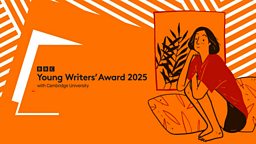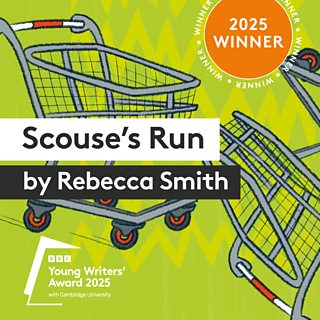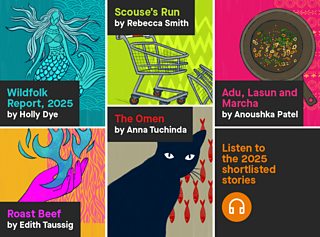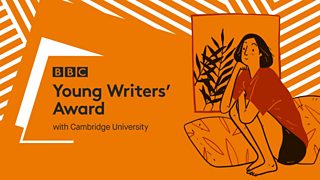Winner of the 2025 ÃÛÑ¿´«Ã½ Young Writers' Award announced!

Huge congratulations to Rebecca Smith, 17, who has won the 2025 ÃÛÑ¿´«Ã½ Young Writers’ Award with Cambridge University, for her story, ‘Scouse’s Run’.
Rebecca was announced as the winner on Tuesday, 30th September, live on Front Row, Radio 4, at a ceremony in Broadcasting House. The ceremony also celebrated the winner of the National Short Story Award.
Her emotionally charged story exploring toxic masculinity, the consequences of bullying, and the violence that comes from suppressed emotions, won enormous praise from the judges. Chair of judges Lauren Layfield, who announced the winner, says:
“It’s important, massively relevant to 2025 and fun to read - until you reach the ending which will take your breath away. Rebecca Smith has written something remarkable, capturing kitchen sink realism and Northern grit - she’s a true talent with a big future ahead and I’m thrilled that she takes the Young Writers Award 2025.”
About her story, Rebecca says:
“I started the story as a sort of epic adventure gone wrong, but as I was writing I began to lean into themes of peer pressure and toxic masculinity. The character Runty’s reaction is a result of built-up resentment from the bullying he has received [and] this violent element demonstrates, in my opinion, how young men deal with feeling powerless.”
-
![]()
You can listen to ‘Scouse’s Run’ here
A gang of teens, a stolen trolley, and a reckless bet. An emotionally charged story set in Yorkshire exploring toxic masculinity, bullying, and the violence that comes from suppressed emotions. Praised by the judges for its ‘strong voice,’ ‘tension’ and ‘undercurrent of danger and violence’.
Alongside ‘Scouse’s Run’ on the shortlist were four other stories - listen to the shortlist stories.
‘Wildfolk Report 2025’ by Holly Dye, 17,from Tunbridge Wells
‘Adu, Lasun and Marcha’ by Anoushka Patel, 18, from Leicester
‘Roast Beef’ by Edith Taussig, 17, from New Malden, Greater London
‘The Omen’ by Anna Tuchinda, 17, from Thailand, an international student in Edinburgh
Click here to read the privacy notice for this year's Young Writers' Award.

Listen to the shortlisted stories
-
![]()
Listen to all of the shortlisted stories
Click to hear this year's entries in full.
About the ÃÛÑ¿´«Ã½ Young Writers’ Award with Cambridge University
Now in its eleventh year, the ÃÛÑ¿´«Ã½ Young Writers’ Award with Cambridge University challenges young people in the UK aged between 14-18 years to submit stories of up to 1,000 words. Submissions for the 2024 award are open until 9am (GMT) Monday 24th March 2025.

About the 2025 Short Stories
- Listen to all the shortlisted stories here -
The Omen’ by Anna Tuchinda
This ‘beautifully subversive’ and ‘unique’ horror story told from the point of view of a black cat was praised by the judges for its strong voice and impactful ending. The story explores superstition, scapegoating and a lack of sentimentality towards death, as a stray cat is blamed when, one after the other, the two people who care for it die. A cat lover, Anna wanted to explore writing from the perspective of a scapegoat, choosing a black cat, often seen as an omen of bad luck. Her writing is inspired by Stephen King, Haruki Murakami and Han Kang.
‘Wildfolk Report 2025’ by Holly Dye
Elves, brownies and mermaids struggle with the destruction of the natural world in this ‘funny’, ‘bold’ and ‘disarming’ story written in the style of an academic report, and blending myth, fantasy and folklore to deliver a ‘witty’ but stark warning about the need for human action to fight climate change. Basing her fantasy creatures on real-world animals, Holly wrote the story in her school library and was influenced by Terry Pratchett’s ‘Discworld’ novels.
‘Adu, Lasun and Marcha’ by Anoushka Patel
A ‘nuanced’ and ‘complex’ story about multi-generational relationships, the passing down of traditions and the burden of unpaid domestic work on women. As a young girl, Amara, and her mother and grandmother cook together while the men relax in an adjacent room watching cricket. As tensions between the women surface, Amara is left to contemplate what it would be like to break free of cultural expectations. The story’s title meaning ‘Ginger, Garlic and Chilli’ in Gujarati, refers to the common cooking ingredients that Anoushka’s mother asks her to fetch from the fridge when she is cooking.
‘Roast Beef’ by Edith Taussig
This ‘weird and wonderful’ ‘housewife’s revenge’ story combines dark humour and the supernatural to explore power, control and the oppressive expectation on women. A note from her husband asking her to cook a roast beef lunch for him and his golfing friends triggers a housewife’s awareness of her situation and fuels a desire for revenge which sends their life up in flames, literally. Edith’s influences include Roald Dahl’s short stories, Shirley Jackson’s The Haunting of Hill House and John Finnemore’s radio comedies.
‘Scouse’s Run’ by Rebecca Smith
A ‘Skilful’ story written in dialect, ‘Scouse’s Run’ tells the story of the titular boy, Scouse, who bets his friends that he can ride a shopping trolley down a hill without screaming or crying out, only to have the challenge go horribly wrong. Praised by the judges for its ‘strong voice’ and ‘tension’ of the fun with the ‘undercurrent of danger and violence’, the story was inspired by a writing group prompt, and explores peer pressure, toxic masculinity and the consequences of bullying and young men’s reactions to feeling powerless.
-
![]()
Learning resources - Young Writers' Award
Get started with our guides to writing a short story.


